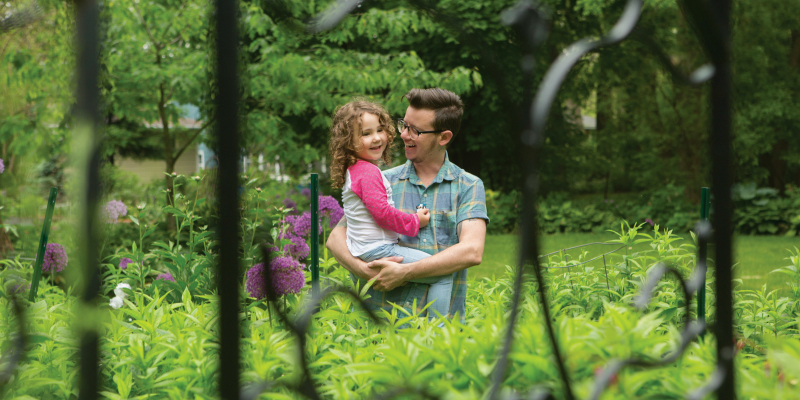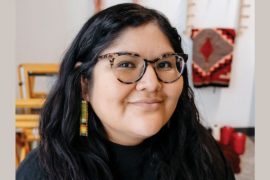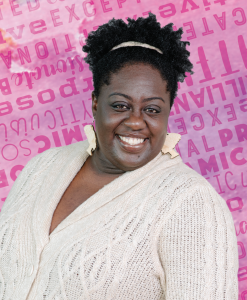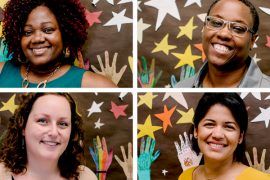By Katy Macek | Photographed by Valerie Tobias
A phone call from Marquette Elementary School’s counselor last June told Marlisa Kopenski Condon that her child’s request to go by a boy’s name and use male pronouns was more than just a game played with friends.
The counselor asked her and her husband, Tim, to come in and go over a Gender Care Plan with their child, who is now 10 years old and goes by Rex.
Fortunately for Rex, his parents and older sister are fully on board with his decision to express his gender identity. For Kopenski Condon and her husband, the struggle has been knowing how best to care for their transgender son.
“The challenge has been knowing how to support Rex,” Kopenski Condon says. “We haven’t really known what to do, so we’ve kind of followed Rex’s lead. If you want to wear boys’ underwear, totally cool. If you want to use the boys’ bathroom in the airport, cool.”
The couple isn’t alone in feeling unprepared. Most parents of LGBTQ youth don’t know where to turn for help and support, says Sherie Hohs, a social worker with Madison Metropolitan School District. They simply don’t have the information because they never had to learn it.
“There is a big gap for adults to see gender diversity and understand gender identity,” Hohs says. “We didn’t get to learn this growing up.”
To help bridge that gap, Hohs said MMSD has introduced support groups as well as LGBTQ topics, especially in health class, into the curriculum. The district recently did training on how to support students through things such as a Gender Care Plan, which counselors go through with students and their parents to help them understand what they are feeling. Questions on the plan include such things as, “What pronouns would you like to use?,” “What name would you like to go by?” and “What bathroom would you like to use?”
Hohs says family acceptance is a No. 1 indicator of positive health outcomes for LGBTQ youth. Acceptance affects everything from the child’s mental health to academic achievement and socioeconomic status.
A study done by the Family Acceptance Project, a national initiative working to prevent health risks for LGBTQ youth, found those who are rejected by their families have lower self-esteem and are more iso- lated than those who are accepted by family.
As those teens became young adults, ages 21 to 25, they were more than eight times as likely to have attempted suicide, nearly six times as likely to report high levels of depression, more than three times as likely to use illegal drugs and more than three times as likely to be at high risk for HIV and sexually transmitted diseases compared to their counterparts who were not at all or only a little rejected by their parents and caregivers based on their identity.
That support can take shape in many different forms, says Lee Young, a 33-year-old transgender man who has become an active voice in the Madison-area LGBTQ community. Young, who with his wife, Amber, has two young children, gives talks in the community and also leads MMSD’s TransParent youth group. Young started transitioning around 24 years old and says, while his parents didn’t outright reject him, he didn’t feel his father and stepmom went out of their way to learn more about his experience nor ask questions about his relationships.
“I knew they loved me, but it felt like I was kind of a bummer,” he says. “They didn’t cut off communication with me, so I’m lucky, but it was really uncomfortable. It didn’t feel like they were at all ready or knew what trans was.”
Since he began transitioning, Young says his relationship with his dad still hits roadblocks because of barriers he can’t help his dad overcome.
“Having kids of my own was a huge reminder just how important family is to me and made me want to be my most authentic self with the people I love,” he says. “It also gave me the courage to share what I needed with my loved ones in order to feel supported.”
In February, Young asked his father to attend a PFLAG meeting, which is an organization uniting families and allies in support and advocacy for the LGBTQ community.
In perhaps his first show of active support for his son, Young’s father, whom Young describes as a hardline conservative, attended the meeting.
“The fact that he walked into that room, just that effort, was amazing,” Young says. “I told him, ‘This might be the most important thing you’ve ever done for me,’ and I think I heard him get emotional. I don’t think he realized it was that simple.”
Groups such as PFLAG can be helpful for parents in finding support, resources and just being around other people who can relate to what they are going through, says PFLAG Madison President Jeanne Williams.
Williams has been a member of PFLAG for 10 years and has served two terms as the group’s president. She’s seen how important the group is not only for advocating for LGBTQ rights but as a safe meeting place to share stories, ask questions and feel heard.
“When parents come to meetings…sometimes they just have questions,” Williams says. “Sometimes they just want to be around other people like them. There’s a sense of community where they feel free to talk.”
Like many parenting experiences, Kopenski Condon says she is constantly learning and always feels a step behind. However, she describes living in Madison and attending the Madison school district as being a huge lifesaver in providing resources and support to LGBTQ students and their families.
If it weren’t for the school district, she says they might never have clearly heard from Rex what he wanted to be called.
“The school sort of pulled us into a reckoning,” Kopenski Condon says. “The first time Tim and I heard what he wanted was with Mrs. G [the counselor].”
The school provides resources and support for parents, Hohs says, including a support group for families with transgender or gender non-conforming youth that has run for around eight years. The group holds monthly meetings at a centralized location on a bus route and also has a Google group chat with resources for parents and family members. Between the in-person meetings and Google group, she estimates more than 200 families are connected.
The support group provides a space for families to swap resources and experiences. Hohs says having a space separate from their kids to do that is extremely necessary for parents as a show of support.
“It’s super important for families to do the work separate from their kids so they can be allies and advocates for kids,” Hohs says. “It affirms their dedication, but also is a space for them to learn and access resources and not have to rely on their child to be the primary source of information because that’s exhausting.”
The district also works with advocacy groups including GSAFE, which among other things, supports students in forming Gay-Straight Alliance groups in the schools. After hearing about GSAs at other MMSD schools last year, Rex and his friend Leo started one of their own at Marquette Elementary.
Navigating the world as a transgender person is not always going to be easy, but when searching out resources, especially in the Madison community, Kopenski Condon is confident it can be done.
She used to worry about the way the world would view her son, but Kopenski Condon says the world has changed a lot since she was growing up. She still worries, as any parent would, but she believes the overall world is more accepting than it was 40 years ago.
At 10 years old, Rex has surrounded himself with friends and family who understand and value him, and if he can keep doing that, she knows he’ll be fine.
In many cases, so does he. When asked about the future, Rex says he isn’t worried about it. And though he describes himself as transgender, he says on a daily basis he often forgets about it.
“Even though being transgender is a big part of me, it’s also a small part of me,” Rex says. “It’s like as normal as eating breakfast.”





Comments are closed.